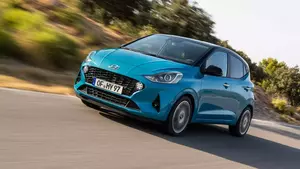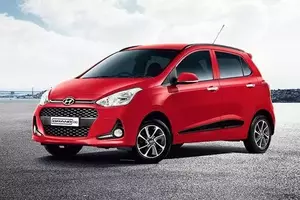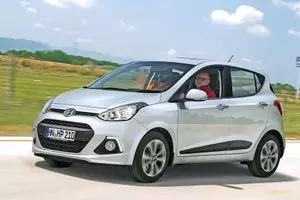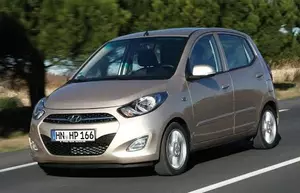
| Vehicle | Curb weight | Difference from world's smallest | Weight to power ratio | 0—60 mph acceleration ratio | Consumption ratio |
|---|---|---|---|---|---|
| 1.0 MPi |
935 kg / 2062 lbs |
510 kg (1125 lbs) heavier | 14 kg to 1 hp | 59 kg/s (130 lbs/s) |
191 kg/L (421 lbs/L) |
| Vehicle | 1.0 MPi |
|---|---|
| Curb weight |
935 kg / 2062 lbs |
| Difference from world's smallest | 510 kg (510 lbs) heavier |
| Weight to power ratio | 14 kg to 1 hp |
| 0—60 mph acceleration ratio | 59 kg/s (130 lbs/s) |
| Consumption ratio |
191 kg/L (421 lbs/L) |

| Vehicle | Curb weight | Difference from world's smallest | Weight to power ratio | 0—60 mph acceleration ratio | Consumption ratio |
|---|---|---|---|---|---|
| 1.0 LPG |
1064 kg / 2346 lbs |
639 kg (1409 lbs) heavier | 15 kg to 1 hp | 74 kg/s (163 lbs/s) |
209 kg/L (461 lbs/L) |
| 1.0 |
1008 kg / 2223 lbs |
583 kg (1286 lbs) heavier | 15 kg to 1 hp | 71 kg/s (157 lbs/s) |
198 kg/L (437 lbs/L) |
| blue 1.0 |
1008 kg / 2223 lbs |
583 kg (1286 lbs) heavier | 15 kg to 1 hp | 71 kg/s (157 lbs/s) |
206 kg/L (454 lbs/L) |
| 1.2 |
1016 kg / 2240 lbs |
591 kg (1303 lbs) heavier | 12 kg to 1 hp | 87 kg/s (192 lbs/s) |
185 kg/L (408 lbs/L) |
| Vehicle | 1.0 LPG |
|---|---|
| Curb weight |
1064 kg / 2346 lbs |
| Difference from world's smallest | 639 kg (639 lbs) heavier |
| Weight to power ratio | 15 kg to 1 hp |
| 0—60 mph acceleration ratio | 74 kg/s (163 lbs/s) |
| Consumption ratio |
209 kg/L (461 lbs/L) |
| Vehicle | 1.0 |
| Curb weight |
1008 kg / 2223 lbs |
| Difference from world's smallest | 583 kg (583 lbs) heavier |
| Weight to power ratio | 15 kg to 1 hp |
| 0—60 mph acceleration ratio | 71 kg/s (157 lbs/s) |
| Consumption ratio |
198 kg/L (437 lbs/L) |
| Vehicle | blue 1.0 |
| Curb weight |
1008 kg / 2223 lbs |
| Difference from world's smallest | 583 kg (583 lbs) heavier |
| Weight to power ratio | 15 kg to 1 hp |
| 0—60 mph acceleration ratio | 71 kg/s (157 lbs/s) |
| Consumption ratio |
206 kg/L (454 lbs/L) |
| Vehicle | 1.2 |
| Curb weight |
1016 kg / 2240 lbs |
| Difference from world's smallest | 591 kg (591 lbs) heavier |
| Weight to power ratio | 12 kg to 1 hp |
| 0—60 mph acceleration ratio | 87 kg/s (192 lbs/s) |
| Consumption ratio |
185 kg/L (408 lbs/L) |

| Vehicle | Curb weight | Difference from world's smallest | Weight to power ratio | 0—60 mph acceleration ratio | Consumption ratio |
|---|---|---|---|---|---|
| 1.2 |
1023 kg / 2256 lbs |
598 kg (1319 lbs) heavier | 12 kg to 1 hp | 70 kg/s (154 lbs/s) | - |
| 1.1 CRDi |
1003 kg / 2212 lbs |
578 kg (1275 lbs) heavier | 14 kg to 1 hp | 68 kg/s (150 lbs/s) | - |
| Vehicle | 1.2 |
|---|---|
| Curb weight |
1023 kg / 2256 lbs |
| Difference from world's smallest | 598 kg (598 lbs) heavier |
| Weight to power ratio | 12 kg to 1 hp |
| 0—60 mph acceleration ratio | 70 kg/s (154 lbs/s) |
| Consumption ratio | - |
| Vehicle | 1.1 CRDi |
| Curb weight |
1003 kg / 2212 lbs |
| Difference from world's smallest | 578 kg (578 lbs) heavier |
| Weight to power ratio | 14 kg to 1 hp |
| 0—60 mph acceleration ratio | 68 kg/s (150 lbs/s) |
| Consumption ratio | - |

| Vehicle | Curb weight | Difference from world's smallest | Weight to power ratio | 0—60 mph acceleration ratio | Consumption ratio |
|---|---|---|---|---|---|
| 1.25 16V |
961 kg / 2119 lbs |
536 kg (1182 lbs) heavier | 11 kg to 1 hp | 73 kg/s (161 lbs/s) |
155 kg/L (342 lbs/L) |
| 1.0 16V |
989 kg / 2181 lbs |
564 kg (1244 lbs) heavier | 15 kg to 1 hp | 69 kg/s (152 lbs/s) |
230 kg/L (507 lbs/L) |
| Vehicle | 1.25 16V |
|---|---|
| Curb weight |
961 kg / 2119 lbs |
| Difference from world's smallest | 536 kg (536 lbs) heavier |
| Weight to power ratio | 11 kg to 1 hp |
| 0—60 mph acceleration ratio | 73 kg/s (161 lbs/s) |
| Consumption ratio |
155 kg/L (342 lbs/L) |
| Vehicle | 1.0 16V |
| Curb weight |
989 kg / 2181 lbs |
| Difference from world's smallest | 564 kg (564 lbs) heavier |
| Weight to power ratio | 15 kg to 1 hp |
| 0—60 mph acceleration ratio | 69 kg/s (152 lbs/s) |
| Consumption ratio |
230 kg/L (507 lbs/L) |

| Vehicle | Curb weight | Difference from world's smallest | Weight to power ratio | 0—60 mph acceleration ratio | Consumption ratio |
|---|---|---|---|---|---|
| 1.1 |
935 kg / 2062 lbs |
510 kg (1125 lbs) heavier | 14 kg to 1 hp | 58 kg/s (128 lbs/s) |
161 kg/L (355 lbs/L) |
| 1.0 |
873 kg / 1925 lbs |
448 kg (988 lbs) heavier | 13 kg to 1 hp | 62 kg/s (137 lbs/s) |
208 kg/L (459 lbs/L) |
| 1.2 |
910 kg / 2007 lbs |
485 kg (1070 lbs) heavier | 11 kg to 1 hp | 78 kg/s (172 lbs/s) |
198 kg/L (437 lbs/L) |
| Vehicle | 1.1 |
|---|---|
| Curb weight |
935 kg / 2062 lbs |
| Difference from world's smallest | 510 kg (510 lbs) heavier |
| Weight to power ratio | 14 kg to 1 hp |
| 0—60 mph acceleration ratio | 58 kg/s (128 lbs/s) |
| Consumption ratio |
161 kg/L (355 lbs/L) |
| Vehicle | 1.0 |
| Curb weight |
873 kg / 1925 lbs |
| Difference from world's smallest | 448 kg (448 lbs) heavier |
| Weight to power ratio | 13 kg to 1 hp |
| 0—60 mph acceleration ratio | 62 kg/s (137 lbs/s) |
| Consumption ratio |
208 kg/L (459 lbs/L) |
| Vehicle | 1.2 |
| Curb weight |
910 kg / 2007 lbs |
| Difference from world's smallest | 485 kg (485 lbs) heavier |
| Weight to power ratio | 11 kg to 1 hp |
| 0—60 mph acceleration ratio | 78 kg/s (172 lbs/s) |
| Consumption ratio |
198 kg/L (437 lbs/L) |

| Vehicle | Curb weight | Difference from world's smallest | Weight to power ratio | 0—60 mph acceleration ratio | Consumption ratio |
|---|---|---|---|---|---|
| 1.1 |
1000 kg / 2205 lbs |
575 kg (1268 lbs) heavier | 15 kg to 1 hp | 68 kg/s (150 lbs/s) |
200 kg/L (441 lbs/L) |
| 1.1 CRDi |
1115 kg / 2459 lbs |
690 kg (1522 lbs) heavier | 15 kg to 1 hp | 74 kg/s (163 lbs/s) |
259 kg/L (571 lbs/L) |
| 1.2 |
1035 kg / 2282 lbs |
610 kg (1345 lbs) heavier | 13 kg to 1 hp | 76 kg/s (168 lbs/s) |
175 kg/L (386 lbs/L) |
| Vehicle | 1.1 |
|---|---|
| Curb weight |
1000 kg / 2205 lbs |
| Difference from world's smallest | 575 kg (575 lbs) heavier |
| Weight to power ratio | 15 kg to 1 hp |
| 0—60 mph acceleration ratio | 68 kg/s (150 lbs/s) |
| Consumption ratio |
200 kg/L (441 lbs/L) |
| Vehicle | 1.1 CRDi |
| Curb weight |
1115 kg / 2459 lbs |
| Difference from world's smallest | 690 kg (690 lbs) heavier |
| Weight to power ratio | 15 kg to 1 hp |
| 0—60 mph acceleration ratio | 74 kg/s (163 lbs/s) |
| Consumption ratio |
259 kg/L (571 lbs/L) |
| Vehicle | 1.2 |
| Curb weight |
1035 kg / 2282 lbs |
| Difference from world's smallest | 610 kg (610 lbs) heavier |
| Weight to power ratio | 13 kg to 1 hp |
| 0—60 mph acceleration ratio | 76 kg/s (168 lbs/s) |
| Consumption ratio |
175 kg/L (386 lbs/L) |